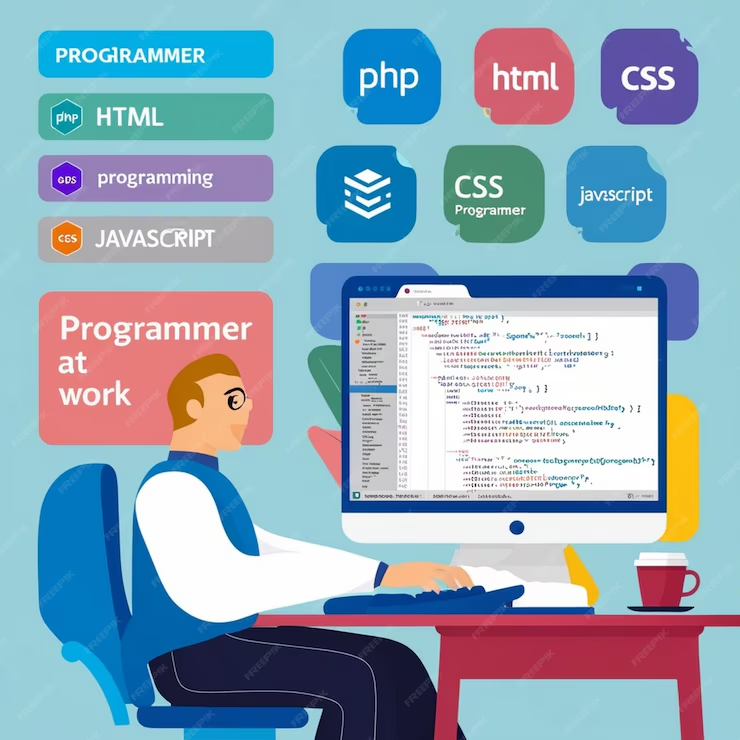Becoming a website developer is an exciting career path for anyone interested in technology, creativity, and problem-solving. Website development involves designing, building, and maintaining websites, making it a highly in-demand profession in today’s digital age. However, one common question aspiring developers ask is: “How long does it take to become a website developer?”
The answer to this question varies depending on your background, learning style, and career path. Some may achieve it in a few months, while others might take several years. Let’s dive into the factors determining how long it takes to become a website developer and what steps you can take to accelerate the process.
Understanding Website Development
Before we explore the timeline, it’s important to understand what website development entails. Website development typically involves two main areas:
- Front-end development: This part of website development focuses on the user interface. Front-end developers work with languages like HTML, CSS, and JavaScript to create a website’s layout, design, and interactive elements.
- Back-end development: This deals with the server side of websites. Back-end developers work with databases, servers, and applications to ensure the website functions correctly. Common languages for back-end development include Python, Ruby, PHP, and Node.js.
Some website developers, full-stack developers, work with front-end and back-end technologies.
Educational Background
The time it takes to become a website developer largely depends on your existing knowledge and education. Here’s a breakdown based on different educational backgrounds:
- Self-Taught (3 to 12 months): Many website developers are self-taught. With the abundance of online resources, free tutorials, and coding boot camps, it’s possible to learn website development without a formal education. If you dedicate yourself to learning a few hours daily, you could start building websites in as little as three to six months. However, mastering all aspects of website development could take up to a year or more.
- Coding Bootcamp (3 to 6 months): Coding bootcamps are intensive programs designed to teach web development in a short period, typically lasting between three to six months. These boot camps cover front-end and back-end development, giving you a fast-track option to enter the workforce. While boot camps are quick, they require a significant time investment and can be demanding.
- Computer Science Degree (3 to 4 years): A more traditional way to become a website developer is to obtain a computer science degree. This option typically takes three to four years to complete. A degree gives you a solid foundation in programming, algorithms, and other important aspects of computer science, which can be beneficial in a long-term career. However, a degree may not focus as heavily on the specific skills required for website development as boot camps or self-study.
The Skills You Need to Learn

The timeline to becoming a website developer also depends on the skills you need to learn. Website development requires a mix of coding languages and tools, and mastering each one can take different amounts of time:
- HTML/CSS (1 to 2 months): HTML (Hypertext Markup Language) and CSS (Cascading Style Sheets) are the building blocks of web development. These are relatively easy to learn, and with dedication, you could become proficient in a month or two.
- JavaScript (3 to 6 months): JavaScript is essential for front-end development, adding interactivity and functionality to websites. Learning JavaScript can take longer than HTML and CSS, with most learners needing three to six months to grasp it well.
- Back-End Languages (6 months to 1 year): If you’re interested in back-end development, you’ll need to learn server-side languages like Python, PHP, or Node.js. Mastering these could take anywhere from six months to a year, depending on your learning speed and the complexity of your projects.
- Databases and Servers (3 to 6 months): Learning how to manage databases (like MySQL or MongoDB) and understanding server-side operations can add another three to six months to your learning journey.
Gaining Practical Experience
Learning web development isn’t just about mastering coding languages. Practical experience is crucial for becoming proficient. The time it takes to gain this experience can vary:
- Building Personal Projects (3 to 6 months): Building personal projects is one of the best ways to accelerate learning. Whether it’s a personal website, a portfolio, or a small web application, applying what you’ve learned in real-world scenarios is invaluable. Building a portfolio of projects could take three to six months, depending on your dedication.
- Freelancing (6 months to 1 year): Another great way to gain experience is through freelancing. Taking on small projects for clients can help you improve your skills and build a portfolio. Many developers start freelancing while still learning, which can take six months to a year to feel confident taking on larger projects.
Becoming Job-Ready
Becoming a professional website developer is not just about technical skills. You also need to be prepared for the job market. Here’s what you should focus on:
- Portfolio Development (1 to 3 months): A strong portfolio showcasing your projects is essential for landing a job. Creating a polished portfolio highlighting your best work could take one to three months.
- Resume and Job Applications (1 to 2 months): Once you feel confident in your skills and have built a portfolio, the next step is applying for jobs. It can take one to two months of applying and interviewing before landing your first web developer job.
Continuous Learning
Even after you land a job, your learning doesn’t stop. Web development constantly evolves, and staying updated with the latest technologies and trends is crucial. Developers often continue learning throughout their careers, whether through online courses, conferences, or self-study.
Conclusion
So, how long does it take to become a website developer? The answer depends on your chosen path, dedication, and existing knowledge. On average, most people can achieve a solid foundation in web development within six months to a year. Whether you self-teach, attend a boot camp, or pursue a degree, persistence, and practical experience are key. With the right mindset, becoming a website developer is an achievable and rewarding career goal.
FAQ’s
Can I become a web developer in 3 months?
It’s possible to gain foundational skills in web development within 3 months, especially if you’re dedicated and learning through an intensive coding bootcamp. However, becoming fully proficient or job-ready might take more time. Practical experience through personal projects and internships is important for long-term success.
Do I need a degree to become a website developer?
No, you don’t necessarily need a degree to become a website developer. Many developers are self-taught or attend coding bootcamps. However, a degree in computer science or a related field can provide a strong foundation and open up more job opportunities, especially for larger companies.
Is web development hard to learn?
Web development can be challenging, especially for beginners, but it’s definitely achievable with dedication and consistent practice. The complexity increases as you move from learning basic HTML and CSS to more advanced concepts like JavaScript, server-side programming, and databases.
How much does a web developer make?
Salaries for web developers vary depending on location, experience, and skillset. In general, junior web developers can expect to earn between $50,000 and $70,000 annually, while experienced developers may earn $90,000 or more. Freelancers can set their rates based on their experience and client base.
Is freelancing a good option for beginner web developers?
Yes, freelancing is a great way for beginner web developers to gain practical experience and build a portfolio. Many freelancers start with smaller projects to gain confidence and gradually move on to more complex assignments.




